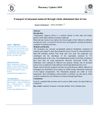 January 2020 in “International journal of medicinal plants and natural products”
January 2020 in “International journal of medicinal plants and natural products” Ayurvedic Panchakarma therapy, Virechan, can effectively manage PCOS symptoms and improve health markers.
 7 citations,
June 2020 in “Experimental dermatology”
7 citations,
June 2020 in “Experimental dermatology” Researchers found that certain lipids, especially vitamin D3, are lower in prematurely grey hair than in pigmented hair.
79 citations,
December 2017 in “Cosmetics” Effective sunscreen formulations can reduce skin absorption and enhance protection.
 34 citations,
July 2014 in “Indian Dermatology Online Journal”
34 citations,
July 2014 in “Indian Dermatology Online Journal” Hair loss linked to metabolic issues and insulin resistance; early assessment may reduce future health risks.
 28 citations,
November 2019 in “Frontiers in Endocrinology”
28 citations,
November 2019 in “Frontiers in Endocrinology” Vegetarian Indian women with PCOS have higher inflammation levels than non-vegetarians.
24 citations,
November 2015 in “Experimental Cell Research” Sebum from sebocytes is important for skin health and linked to conditions like acne and hair loss.
5 citations,
April 2014 in “Journal of Lipid Research” SCD1 inhibitors can cause skin issues in rodents.
36 citations,
March 2014 in “Molecular and Cellular Biology” Cidea is essential for proper lipid storage and secretion in sebaceous glands, affecting skin and hair health.
 24 citations,
January 2012 in “Journal of Cellular Biochemistry”
24 citations,
January 2012 in “Journal of Cellular Biochemistry” C-reactive protein helps monocytes stick to blood vessel cells by causing oxidative stress.
January 2014 in “Healthy aging research” Polycystic ovarian disease symptoms can continue after menopause, making diagnosis and management in older women challenging.
 March 2018 in “International Pharmacy Acta”
March 2018 in “International Pharmacy Acta” New niosomal formulation effectively delivers aminexil through rat skin.
 September 2023 in “Dermatology and Therapy”
September 2023 in “Dermatology and Therapy” Baricitinib effectively regrows hair in most people with severe alopecia, especially those with patchy hair loss, but hair may fall out again if treatment stops.
52 citations,
April 2008 in “Therapeutics and clinical risk management” The birth control combination of ethinylestradiol and drospirenone helps treat symptoms of polycystic ovary syndrome.
 9 citations,
September 2017 in “Journal of Investigative Dermatology Symposium Proceedings”
9 citations,
September 2017 in “Journal of Investigative Dermatology Symposium Proceedings” Prostaglandin D2 increases testosterone production in skin cells through a process involving reactive oxygen species, and antioxidants may help treat hair loss.
 78 citations,
March 2017 in “JAMA Dermatology”
78 citations,
March 2017 in “JAMA Dermatology” Tofacitinib helped regrow hair in people with severe alopecia, but side effects occurred and benefits stopped after treatment ended.
3 citations,
February 2021 in “FEBS open bio” Camellia japonica extract may improve scalp health and promote hair growth.
 February 2024 in “Heliyon”
February 2024 in “Heliyon” People with androgenetic alopecia have different lipid levels in their blood, which vary between men and women, and may be linked to a higher risk of metabolic syndrome.
 10 citations,
March 2022 in “Communications biology”
10 citations,
March 2022 in “Communications biology” A new non-invasive method can analyze skin mRNA to understand skin diseases better.
 8 citations,
February 2022 in “Scientific Reports”
8 citations,
February 2022 in “Scientific Reports” Medicinal herbs might treat hair loss by affecting genes and pathways related to lipid and glycerophospholipid metabolism.
 17 citations,
May 2015 in “Nanomedicine: Nanotechnology, Biology and Medicine”
17 citations,
May 2015 in “Nanomedicine: Nanotechnology, Biology and Medicine” Scientists created tiny particles loaded with a hair growth drug, minoxidil, that specifically target hair follicles and skin cells to potentially improve hair growth.
April 2016 in “The journal of investigative dermatology/Journal of investigative dermatology” Sebaceous gland atrophy and abnormal function may contribute to hair loss in psoriasis.
8 citations,
February 2022 in “International Journal of Dermatology” Lipids are crucial for healthy hair, protecting it from damage and breakage.
95 citations,
July 2015 in “European journal of pharmaceutics and biopharmaceutics” Lipid nanoparticles can help deliver drugs through hair follicles but struggle to penetrate deeper skin layers.
 8 citations,
December 2016 in “Revista Medica De Chile”
8 citations,
December 2016 in “Revista Medica De Chile” Finasteride can cause sexual dysfunction, sperm changes, and affect bone density and metabolism.
 28 citations,
March 2014 in “International Journal of Nanomedicine”
28 citations,
March 2014 in “International Journal of Nanomedicine” New lipid nanoparticles show promise for delivering hair loss treatments but need improvement for better skin penetration.
6 citations,
September 2021 in “Autophagy” Autophagy prevents early aging and maintains lipid and pheromone balance in mouse glands.
67 citations,
December 2013 in “Journal of Biological Chemistry” SCD1 is crucial for skin health and overall energy balance.
 June 2022 in “Journal of the Liaquat University of Medical and Health Sciences”
June 2022 in “Journal of the Liaquat University of Medical and Health Sciences” People with lichen planus are more likely to have abnormal blood fats than healthy people.
 6 citations,
May 2022 in “Frontiers in Microbiology”
6 citations,
May 2022 in “Frontiers in Microbiology” Marine microbes could be used in cosmetics for sun protection, skin care, and possibly preventing hair loss.
 16 citations,
August 2014 in “Colloids and surfaces. B, Biointerfaces”
16 citations,
August 2014 in “Colloids and surfaces. B, Biointerfaces” Lipid-coated silica nanoparticles penetrate human skin more deeply than bare silica nanoparticles.


















